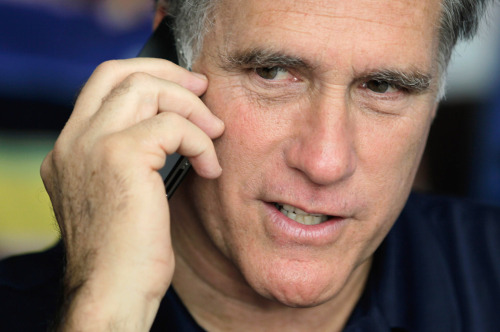Mitt Romney has won the Republican primary in Florida, soundly defeating Newt Gingrich and taking a big step toward becoming the Republican challenger to President Barack Obama.
 |
Republican presidential candidate and former Massachusetts Gov. Mitt Romney works the phones for votes at his campaign headquarters on January 31, 2012 (AFP) |
With his win, Romney has recovered the political momentum he had lost after Gingrich’s victory in the Jan. 21 South Carolina primary. Florida was by far the largest of the first four nominating contests.
The win gives Romney, a former Massachusetts governor, all 50 of Florida’s delegates to the Republican National Convention in late August in Tampa, Florida. Romney now has 87 to Gingrich’s 26. A candidate will need 1,144 delegates to become the nominee.
Returns from nearly two-thirds of Florida’s precincts showed Romney with 47 percent of the vote, to Gingrich’s 31 percent.
Gingrich, the former speaker of the House of Representatives, has vowed to fight on until the convention regardless of Tuesday’s outcome. He says the race is far from over.
But recovering from the loss may be difficult. Romney has a huge advantage in money and organization. The pace of the campaign will slow in February and the few contests include those in Michigan and Nevada, states where Romney is heavily favored.
Speaking to cheering supporters, Romney said he was ready “to lead this party and our nation.” He barely mentioned his Republican rivals, instead looking ahead to a general election campaign against Obama.
“Mr. President, you were elected to lead, you chose to follow, and now it’s time to get out of the way,” he declared.
Two other candidates, former Sen. Rick Santorum and congressman Ron Paul, remain in the Republican race, but they conceded Florida to their rivals and remain longshots for the nomination. Santorum had 13 percent and Paul 7 percent.
Romney has been the front-runner for most of the Republican campaign even as a series of challengers have soared in the polls, only to quickly fade. A former CEO of a private equity firm, Romney has touted his business experience as he casts himself as the candidate most likely to defeat Obama in an election in which jobs and the economy are the big issues.
He narrowly lost the first contest, the Iowa caucuses, to Santorum in a race so close that he was initially declared the winner. He then easily won in New Hampshire.
But Gingrich countered with the upset victory in South Carolina, winning over conservatives who saw Romney as too moderate. Gingrich’s fiery attacks on Obama and America’s media “elite” struck a chord with the state’s conservative electorate, even as much of the Republican establishment worried the former House speaker was too erratic to become the party’s nominee.
But Florida was a tougher state for Gingrich. Voters are more diverse than in South Carolina. The vast size of the state and the variety of media markets make advertising campaigns more important.
Romney and Restore our Future, an outside group supporting him, outspent Gingrich and his outside organization, by about $15.5 million to $3.3 million, an advantage of nearly 5-1.
Romney also shifted tactics. He shed his reluctance to attack Gingrich, unleashing hard-hitting ads on television, sharpening his performance in a pair of debates and deploying surrogates to the edges of Gingrich’s own campaign appearances, all in hopes of unnerving him.
“I needed to make sure that instead of being outgunned in terms of attacks, that I responded aggressively, and hopefully that will have served me well here,” Romney told reporters.
Gingrich responded by assailing Romney as a man incapable of telling the truth. He sought the support of evangelicals and small-government tea party advocates, running as the antiestablishment insurgent of the party he once helped lead.
Gingrich said the race for the nomination won’t be decided until summer, “unless Romney drops out.”
Florida will be especially important in the November election, which is essentially a series of simultaneous state-by-state votes. With many states solidly Republican or Democratic, Florida is one of a few unpredictable swing states that will likely determine the winner.
With Florida’s unemployment rate hovering around 10 percent, about two-thirds of voters there said the economy was their top issue, according to exit poll results conducted for the Associated Press and the television networks. More than 8 in 10 said they were falling behind or just keeping up. And half said that home foreclosures have been a major problem in their communities. (AP)







